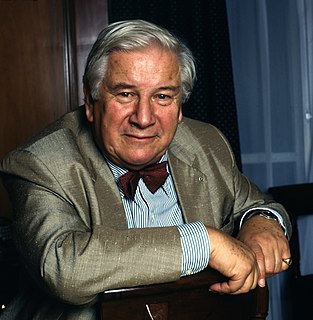A Quote by Peter Ustinov
There are experts in little things but there are no experts in big things. There are experts in this fact and that fact but there are no moral experts.
Quote Topics
Related Quotes
The ...experts of the FDA have declared Laetrile to be worthless...quackery and fraud...These experts are the professional descendants of experts...confident that mental illness should be cured by drilling holes in the skull, the better to let the demons out. ...This is the Orwellian fashion in which the medical establishment throws its weight around.
Most people consider themselves above the gritty and relentless details of life that allow the creation of great wealth. They leave it to the experts. But in general you join the one percent of the one percent not by leaving it to the experts but by creating new expertise, not by knowing what the experts know but by learning what they think is beneath them.
Are there experts, ethical experts, that's very offensive to all of us? Because it's part of our humanity to have a stake in these questions to feel that we ourselves know the difference between right and wrong. And then along come these experts, philosophers, claiming, you know, an expertise, a special training, a special skill, a special talent.
Most of what we know we don't really know first hand. I've never seen a cancer cell. But I trust this community of experts who have, so I believe that cancer exists. But we trust these experts, and we trust that the experts have a system of checks and balances and self-correction. And we have to insist that experts have certain certifications. They're not perfect. Every once in awhile there's an engine falls off the wing of a plane, or a tax audit happens and you find out your expert made a mistake. But it's a pretty good system. It's the best system we've got.
Another of the qualities of science is that it teaches the value of rational thought, as well as the importance of freedom of thought; the positive results that come from doubting that all the lessons are true... Learn from science that you must doubt the experts. As a matter of fact, I can also define science another way: Science is the belief in the ignorance of experts.


































